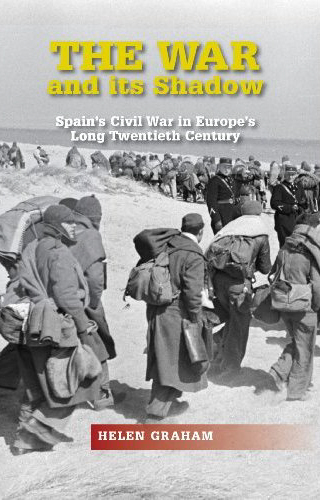Gary Raymond considers the Spanish Civil War and its legacy in his review of The War and its Shadow by Helen Graham.
Perhaps the most important sentence in Helen Graham’s excellent addition to the new strain of outré-looking Spanish modern histories is from her introduction: ‘At Srebrenica and elsewhere in Bosnia the work of identifying and recuperating the victims of nationalism continues.’ The War and its Shadow never suffers from a myopic special-interest focus of Hispanophile writing (although the passion for the subject is clear). It is a book concerned with the lessons we can learn, and the parallels that can be drawn. It is a book concerned with what must now be considered the most important revisionist project in the study of world history, and that is the significance and truth of the Spanish Civil War. Every new work that comes out on the subject cracks a chink in the collective shadow of Spain’s memory, of Europe’s memory, and of the purposeful ignorance of the European ruling classes. And as long as the first step on the road to learning the lessons of our recent history go untrodden – i.e. admitting to the truths – then the pattern will continue to imitate itself into perpetuity, from the far reaches of Sri Lanka, through the Congo and Rwanda right back to our oh-so-precious doorstep in the form of the disintegration of Yugoslavia. There is a real solid connection between these human, man-made tragedies, and the connections are just as much psychological as they are historical or, even, academic.
Graham’s book will exist under a shadow if its own, of course, in the form of Paul Preston’s The Spanish Holocaust published earlier this year, (Preston is acknowledged in The War and its Shadow as General Editor). Preston’s book is a big, imposing axe-wielding statement in the trend of the big imposing serious-but-popular history books of the last few decades. It is clear, bold, novelistic in development, and would prove a damn good read were it not a work of significant historical worth. Graham’s book is more modest in scope, and in publishing terms is a minnow. But it packs a lasting punch, and delivers some stories, statistics and analogies that will surely be returned to as this revisionism develops over the coming years. Her research is second to none.

by Helen Graham
250pp, University of Sussex Press
Graham’s book is the first to take Preston’s big cast-iron statements and run with them moving into different territory. Whereas Preston was often concerned with creating a litany of personal stories to illustrate the human side of the war, Graham too focuses on the personal, but is less ambitious in this way. It works to her advantage as one angle that will need to be taken in the fight against the popular and incorrect – and dangerous – perceptions of this war will be that of the consummate historian. And so the techniques of Graham’s highly distinct and provocative book are very familiar. This makes her assertions – she is a Preston-ite, and her tack is very similar to his – all the more striking. What Graham’s work does is mark the beginning of a ‘grass-roots’ trend in regards to how academics treat this part of history.
It is important now that upon the foundations of Preston’s important work that the conversation opens up. It seems that Graham has taken his lead extremely well, and she brings important contrasts into the debate, such as General Pinochet and Stalin. The misrepresentation of Franco’s Spain cannot be understood, she asserts, until we understand the representations of these regimes. And everything will inform everything else.
Graham, although her feet planted in the academic tradition, is an engaging prose-writer, and at times it feels as though her talent and vision has not been best served by a surprisingly uninspired publisher. There are – shockingly for a university print – typographic errors that scream from the page, and the images could be clearer and given more space on the page. The whole thing feels cluttered, rushed and entirely unsatisfying. The text, the drive of the argument, and the sheer importance of what Graham has to say cry out for a bit more respect from the people who have put the book together.
But make no mistake, the current work being done in the revisions of modern Spanish history will have repercussions as the movement begins to gain momentum. When the truth of Franco’s vision becomes the accepted story, it will reflect upon the nature of so much that came after. The Spanish Holocaust was the definitive and bold starting point for this re-positioning, and Helen Graham’s excellent, engaging, enlightening work, is exactly the sort of argument that needed to come after it.


 Enjoyed this article? Support our writers directly by buying them a coffee and clicking this link.
Enjoyed this article? Support our writers directly by buying them a coffee and clicking this link.







